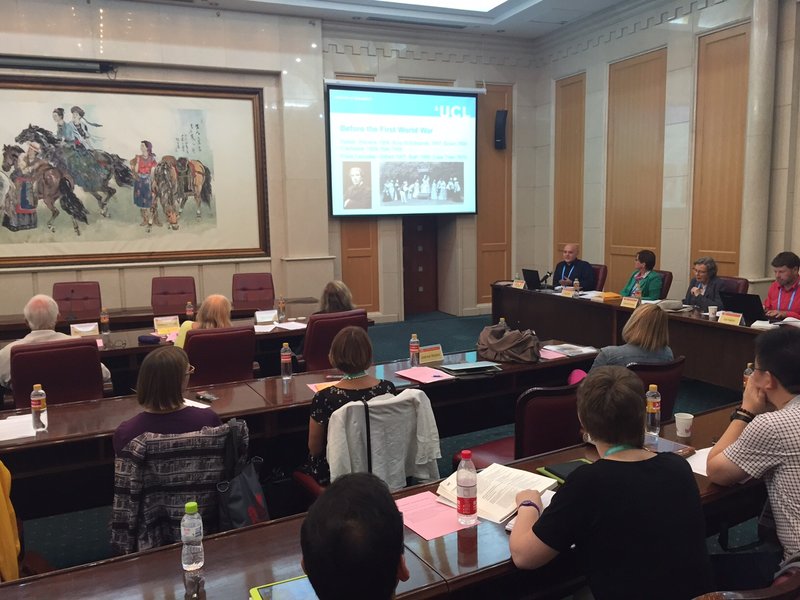Pageants at ICHS 2015
Two members of the project team, Mark Freeman and Tom Hulme, are in Jinan, in Shandong province in China, to attend the 22nd International Congress of Historical Sciences. This massive quinquennial event has well over 2,500 delegates, and has caused quite a splash in China. It has attracted the attention of the English-language newspaper China Daily, and the opening ceremony was addressed by vice-premier Liu Yandong.
The ICHS is organised into ‘major themes’, ‘specialised themes’, ‘joint sessions’ and ‘round tables’. Our paper was in joint session 8, ‘Nostalgia in historical consciousness and culture’. Each session lasts three-and-a-quarter hours, with a short tea break in the middle, and ours had six papers, though some have as many as ten. Each speaker in the ‘Nostalgia’ session, which was excellently organised by Arja Virta from the University of Turku, Finland, was allocated just 10 minutes to speak. This allowed plenty of time for the discussant, Elizabeth Erdmann from the University of Erlangen-Nuremberg, to consider each paper in turn and identify the major themes, and for the audience to make their contribution to the discussion too.
In our paper we delivered a very short introduction to historical pageants, and to some of the main research questions that we are addressing. Our written paper showcased three pageants – Warwick in 1906, Salford in 1930 and Nottingham in 1949 – as examples of some of the main trends that we have identified in historical pageants over time. We concentrated on three key themes: (1) the survival of historical pageants into the 1950s; (2) the intense localism that characterised much of the language of historical pageantry; and (3) the role that pageants saw history and nostalgia as playing in the present and future. Other papers in the session considered that nostalgia, while it might be ‘pernicious’, could in some respects play a progressive role in shaping present and future understandings and actions. In the case of the Nottingham pageant, the city council explicitly impressed on the citizens the ‘hope’ that ‘this Pageant may, through the medium of theatrical entertainment, increase your pride of Nottingham’s present, and strengthen your sense of responsibility for Nottingham’s future’.
Mark delivering our paper at ICHS 2015 (Jinan, China).
After all of the papers had been delivered, and the delegates adjourned for a coffee break, Tom joined Mark at the 'speakers table' to field questions - first from the 'discussant', Elizabeth, and then from the audience. The discussant raised the issue of the boundary between education and entertainment and, having read our pre-circulated paper, questioned the historical authenticity of pageantry (as she pointed out, Lawrence du Garde Peach, pageant-master at Nottingham in 1949, had said he was more interested in spectacle than fact). Tom agreed that the boundary between authenticity and entertainment had become blurred as the century progressed, but pointed out that there were many occasions when pageanteers or local people challenged omissions from the historical narrative. One such example can be seen in the Manchester Pageant in 1938; originally, the infamous Peterloo Massacre of 1819 was seen as too contentious for inclusion, but working-class pressure groups in the city rallied to make sure it was given an airing.
A question from Joanna de Groot (University of York) in the audience then raised the issue of how comprehensive our project was, whether it took a four nations approach, and whether oral history was being used. Mark answered and, concentrating on the example of Scotland, explained how the project was attuned to the differences between the form in Wales, Scotland and England (a three-nations rather than four-nations, admittedly! see Tom's recent blog on this). Tom answered and explained the oral history approach in Carlisle and Bury St Edmunds, and demonstrated the ways in which oral history was helping us understand the emotive impact of pageantry in terms of nostalgia (we are blogging this too!). Tanja Vahtikari (University of Tampere), who has started researching Communist pageants in Finland, then asked about whether pageants that had 'counter-narratives', or even pageants that were countered completely with protest. Mark outlined the variety of responses that occurred when local people thought pageants were taking liberties with history or control, and demonstrated how this was helping us challenge a historiography that has tended to see pageants as examples of elite domination over local populations. He then handed over to Tom, who described the adaptability of the movement (and the use of pageantry by organisations such as the Co-operative Society), and also giving the example of the puppet protest in Bury St Edmunds in 1959.
A panoramic view of our room at ICHS 2015
All-in-all it has been a great conference, and, for us, a really stimulating panel session. It was pleasing to see that we have already taken account of the potential problems or alternative directions that pageantry research can be taken, which bodes well for our final publications. It was also nice that, in one of the coincidences that often arise when we present the results of our research, it turned out one of the other speakers, in her childhood, had known Lawrence du Garde Peach, pageant-master at Nottingham in 1949. Peach also wrote the farcical play The Town That Would Have a Pageant. Here's to ICHS 2020!
Mark Freeman and Tom Hulme


